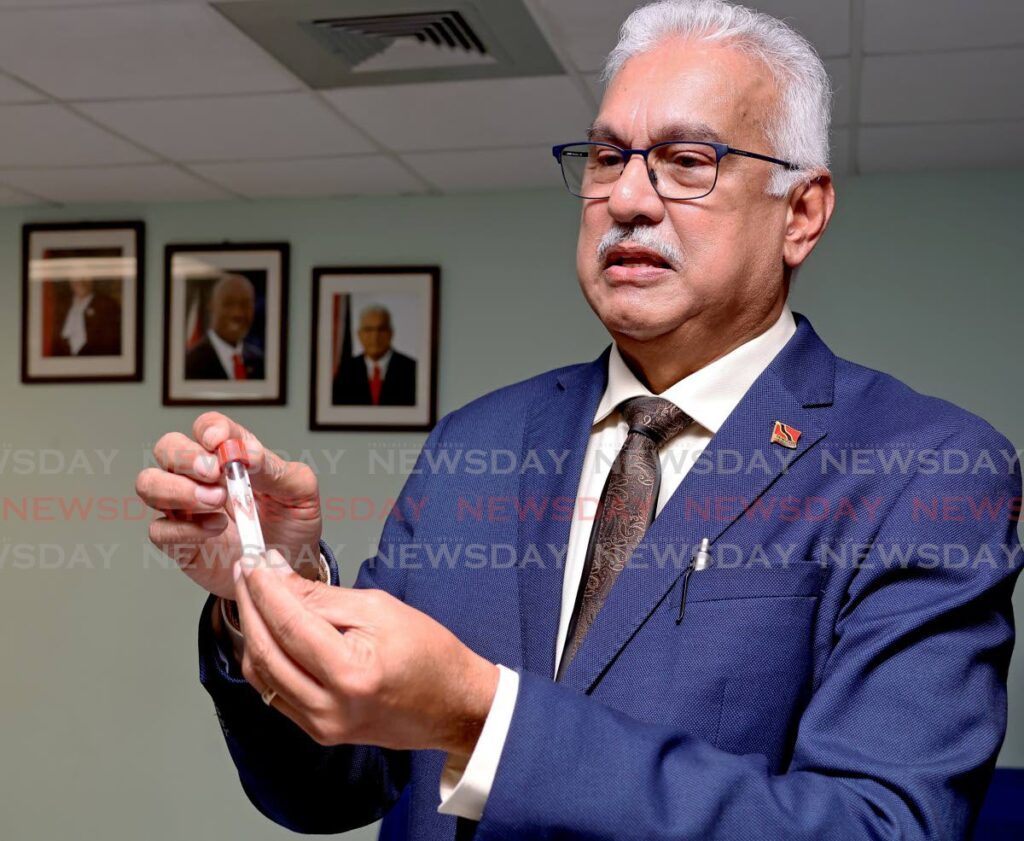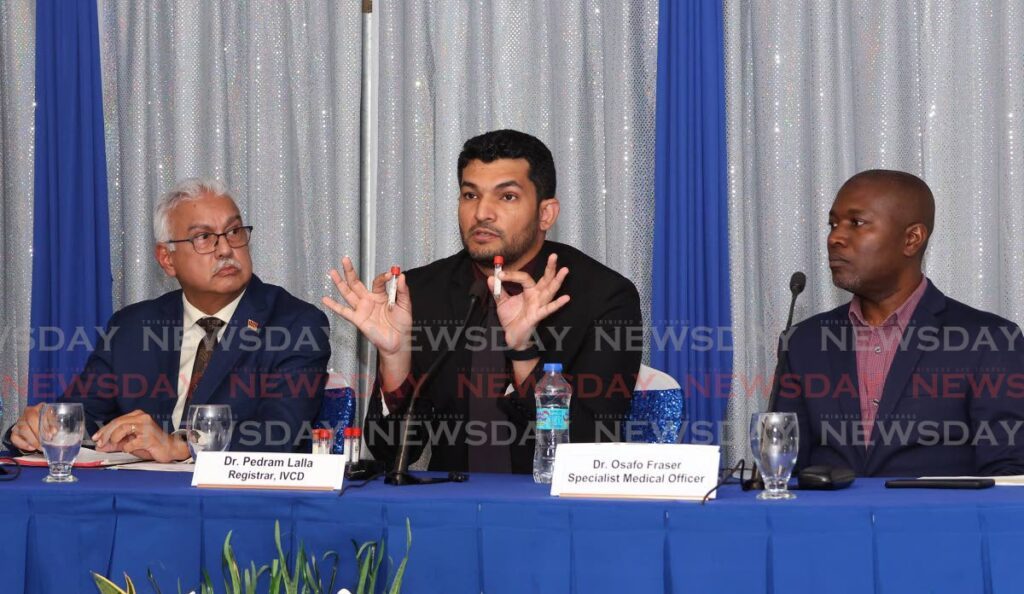News
Clint Chan Tack

HEALTH Minister Terrence Deyalsingh said children and young people between the ages of six and 20 are most at risk of contracting dengue fever.
Having previously suffered from dengue, Deyalsingh says he sympathises with anyone who has contracted the virus or knows someone who has.
He made the comments at a press conference at the San Fernando University Hospital on July 25.
He told the media that he had been advising people to take necessary precautions to protect themselves against dengue fever since he was appointed minister in 2015.
“By the way, I had dengue fever in 2015. So I know.
“My platelet count dropped. I was hospitalized for two nights in Port of Spain (general hospital). So I know what a dengue patient goes through.”
Asked about the groups of people most vulnerable to dengue, Deyalsingh said: “The age group between six and 20 years accounts for 78 per cent of cases.”
In this age group, he said, most cases involve children between 11 and 15 years old.
Next come children aged six to ten and people aged 16 to 20.
“More and more young people are being infected.
“We don’t know why yet. That’s what the data shows.”
Asked whether older people with comorbidities (other diseases such as hypertension and heart disease) were also more vulnerable to dengue, Deyalsingh said: “People most likely to succumb to severe dengue, especially multiple dengue haemorrhagic fever, which is characterised by bleeding, are the young, children and older people with comorbidities.”
He added that the immune system of children is not fully developed, while that of elderly people with comorbidities is compromised.
On protecting pregnant women and their babies from dengue, Deyalsingh said, “We have been working a lot in our antenatal clinics through the women’s health directorate. I have asked Dr (Adesh) Sirjuesingh (CEO) to do this since the beginning of the year. Remember, I have resumed our activities since January (to create awareness about protecting themselves from dengue). I have ensured that our antenatal clinics, where 93% of pregnant women come to deliver their babies, organise lectures. We organise discussions and distribute pamphlets in all our antenatal clinics on mosquito-borne diseases – Zika, Chikungunya and Dengue.”
He added that the ministry is also advising obstetricians and gynecologists in the private sector to educate the remaining seven percent of pregnant women who come to them about these diseases.

South West Regional Health Authority Director (Health Promotion), Dr Sandi Arthur, said the main concern in this case is that pregnant women will contract the Zika virus.
Arthur recalled that when a resurgence of the Zika virus occurred in 2016, it was shown that there was “a risk that the newborn would have congenital malformations, more specifically microcephaly (small head).”
She said of dengue fever: “We have not observed or noted any congenital malformations or anything like that in them.”
But Arthur added: “Pregnancy is one of those immunocompromised states. So we don’t want pregnant women to get sick, because if they develop severe or haemorrhagic dengue fever, it can have a negative impact on the outcome of that pregnancy, for both the mother and the baby.”
She said no cases of maternal mortality related to dengue fever had been reported.
Deyalsingh and SWRHA’s accident and emergency (A&E) department head Dr Reeta Moonesar said all hospitals were fully prepared to deal with dengue cases.
Referring to Deyalsingh’s earlier statement that the number of dengue cases had increased from 450 to 509, Moonesar said there was an increase in cases and an increase in hospitalisations (of dengue patients), but added: “Rest assured, there are avenues, clinical and otherwise, to address this, starting with the local health centre, emergency and (hospital) wards, and a system is in place to manage this.”
Moonesar said there are different classifications of dengue fever.
“Of course you’re going to have fever, muscle aches, myalgia, arthralgia and that will easily go away. The treatment (for dengue) would of course be rest, hydration. Oral hydration as much as possible. Use your oral hydration salts, your coconut water, your water, your Gatorade, etc. Bed rest and paracetamol.”
She advised against taking medications such as aspirin which could worsen dengue symptoms.
“What we are concerned about are patients who have warning signs.”
Moonesar identified lack of appetite, vomiting, severe abdominal pain, extreme fatigue, bleeding gums and skin rashes as symptoms of dengue fever that warrant immediate medical attention.
Medical staff were asked whether dengue fever could kill people with diseases such as cancer.
Arthur said: “When we look at cause of death, we can have multiple factors present in the same person. When we write or issue a death certificate, what we put as the primary cause of death is the condition that caused the death at that time.
“So a person may have a malignant disease. They may have contracted dengue fever. However, if they have dengue fever, but it is just because they contracted it at the same time, but they did not have any complications of dengue fever that could be implicated as a cause of death, it will not be considered as a cause of death.”
Arthur said that in such cases, a co-existing illness is mentioned on a person’s death certificate, “but it would not be listed as the primary cause (of death).”
Deyalsingh dismissed public claims regarding the number of dengue cases.
He reminded the media that dengue fever is endemic in Trinidad and Tobago and the country has been battling it since 1981.
After repeating the point that the Aedes aegypti Mosquitoes only breed in clear, clean, stagnant water, Deyalsingh recalled, recounting that Diego Martin had a huge dengue outbreak a decade ago. But he added that there were no swamps or dirty stagnant water bodies in the area.
Deyalsingh said the ministry and other stakeholders are now actively combating dengue in Victoria, St Patrick and Caroni counties, where most cases have been reported.